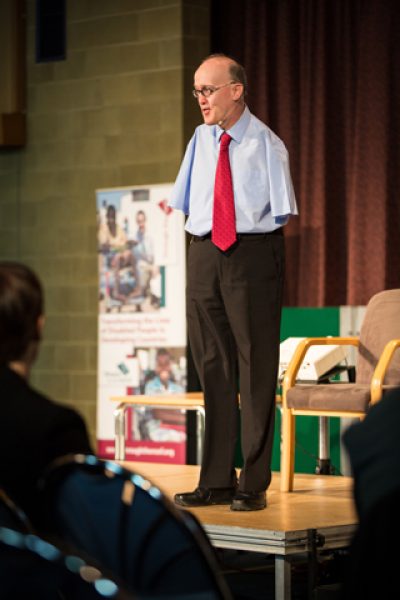A Master-Class in Disability Inclusion (Ros' Blog)

“We had a problem at church on Sunday,” someone told me as we chatted at the Big Church Day Out, “a disabled lady in our church was disgruntled because she felt people were ignoring her. But the thing is, we don’t always want to be swamping her with offers of help. It’s difficult to get it right.”
I tried to make some suggestions as to how to strike the right balance, but I couldn’t help reflecting on her words after the event was over. On an earlier occasion, a lady had told me, “At church everyone just assumes that any time I ask for help or for prayer it must be something to do with my disability. But one time I just wanted prayer because my mum had died, and no one gave me the opportunity to say so.”
So how do churches “get it right” for their disabled members? How do they give them enough assistance to participate fully, but not so much assistance that they feel singled out as Exhibit A? How do they give them an opportunity to say what is really on their mind, and not just assume that it must be disability-related? How do they enable disabled people to exercise their gifts fully for the blessing of the church?
In this, as in any area of church life, Jesus is the supreme role-model. In Mark 10. 46 – 52 we read,
As he was leaving Jericho with his disciples and a great crowd, Bartimaeus, a blind beggar, the son of Timaeus, was sitting by the roadside. And when he heard that it was Jesus of Nazareth, he began to cry out and say, “Jesus, Son of David, have mercy on me!” And many rebuked him, telling him to be silent. But he cried out all the more, “Son of David, have mercy on me!” And Jesus stopped and said, “Call him.” And they called the blind man, saying to him, “Take heart. Get up; he is calling you.” And throwing off his cloak, he sprang up and came to Jesus. And Jesus said to him, “What do you want me to do for you?” And the blind man said to him, “Rabbi, let me recover my sight.” And Jesus said to him, “Go your way; your faith has made you well.” And immediately he recovered his sight and followed him on the way.
There are several things I notice in this story. Firstly, a blind beggar sitting by the roadside must have been quite noticeable, especially to Jesus whose mandate, according to Luke 4, was “to proclaim liberty to the captives and recovering of sight to the blind.” Yet Jesus didn’t make a beeline for him, or draw attention to him in any way. However, as soon as Bartimaeus learned that it was Jesus passing by, he immediately wanted to attract His attention, and began calling out to Him. And without hesitation, Jesus responded to his call. We could learn much from this in churches – to treat disabled people just as we treat every other member, without drawing attention to any difference, yet ready at any moment to respond to a request from them.
Jesus did not respond by going to him, helping him to his feet and drawing very public attention to his disability. Instead, He allowed him the dignity of making his own way over, just as any other person would have done. It would not have been necessary to give him that level of assistance since, as the story makes clear, he was capable of leaping to his feet, throwing off his cloak and making his own way to where he heard Jesus speaking. We would do well to follow Jesus’ example of respecting people’s independence.
Once he was within speaking distance, Jesus asked him, “What do you want me to do for you?” Jesus’ mission was to heal, and yet He made no assumptions about what Bartimaeus wanted from Him. Perhaps Bartimaeus might have perceived his own greatest need as loneliness, or financial hardship. Jesus gave him the opportunity to articulate what he himself saw as his most pressing need. Only when Bartimaeus replied, “Rabbi, let me recover my sight” did He heal him of his blindness.
And finally, Jesus continued to respect his autonomy after the healing. He didn’t direct him where to go, or tell him, “Now you have an amazing testimony, and it’s your duty to go around witnessing to what God has done.” Instead, he left Bartimaeus to decide where to go and what to do. Understandably, Bartimaeus’ decision was to follow Jesus. Why wouldn’t he stay as close as possible to the one who had respected his dignity and given him the gift of healing?
In our churches, we can learn so much from this. We should be ready and available to help our disabled members, and we should create an atmosphere in which they feel able to reach out to us for whatever they need. It’s not wrong to ask if help is needed, but it’s good first to give people the chance to decide whether to reach out for assistance. We should give help where needed and respect independence where help is unnecessary. We should not assume we know what the person needs, but give them the opportunity to express what it is they are looking for, and we should not assume what gifts they have and how they want to exercise them, but should give them the space and freedom to become all God wants them to be and to follow Jesus wherever He leads.

